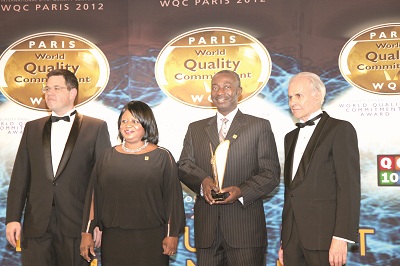All Nations University College launches miniature satellite
 Students working on the CanSat in the laboratoryGhana’s first miniature satellite will be launched Wednesday in Koforidua.
Students working on the CanSat in the laboratoryGhana’s first miniature satellite will be launched Wednesday in Koforidua.
It was designed and built by students and researchers of the All Nations University College’s Intelligent Space Systems Laboratory (ISSL).
The research device, known as the Deployable CanSat, will be launched into the sky at the university’s new campus along the Koforidua-Akwadum road.
The satellite, with built-in sensors, cameras, battery, global positioning system (GPs) and transceivers and intelligent components that are contained in a 500 ml can-sized material, will collect information about the environment.
By analysing the data recorded by the first home-made CanSat, the students and researchers of the ISSL of the university will assess and investigate the reasons for its success or failure.
The Director of ISSL of ANUC, Mr Manfred Quarshie, told the Daily Graphic that the device will be launched into the sky on a weather balloon and using a parachute it will slowly descend to the ground while performing its designed mission and transmitting its telemetry to the ground station.
“The launch is aimed at providing us a unique opportunity to acquire more basic knowledge of space satellite engineering”, the Japanese and South African trained space and satellite engineer stated.
“The university is so much committed to pursuing space science and developing space science engineering students in the near future”, he stressed.
“It is our desire to accomplish a process that will advance knowledge in space engineering and attract and empower students in a rewarding and inspiring environment that fosters creation and innovation”, Mr Quarshie added.
He stated that the private university’s space science project was meant to “provide our interested students practical training in the development of education in satellite operation”
“Our activities will allow us to establish international collaboration network of contact in the international space education and also participate in international competitions”, he added.
According to him, satellites have improved security, telephone and internet services, navigation and broadcasting, weather forecasting, medical services, humanitarian aid and many more.
“We acknowledge the numerous scientific accomplishments due to technology use which have brought major scientific breakthroughs particularly in climate observation and earth resource monitoring”, Mr Quarshie stated.
“Our aim as a lab is to design, build and launch Ghana’s first earth observational satellite which will be called GhaSat 1 into orbit in the next two years while establishing ground station for both institutional and industrial research purpose in six months time”, he stated.
It would be recalled that, the university held a two-day space and satellite workshop that attracted international space and satellite experts from the Unites States of America, Japan, Canada and Ghana.
No comments:
Post a Comment